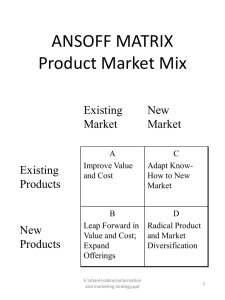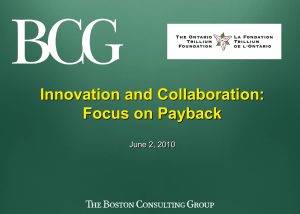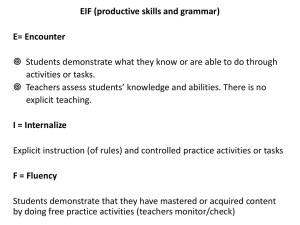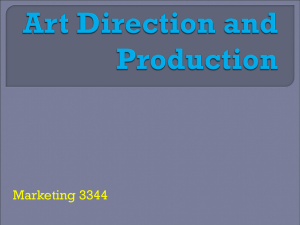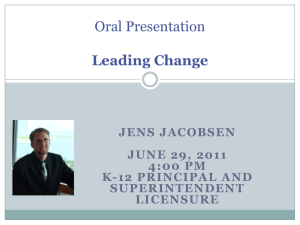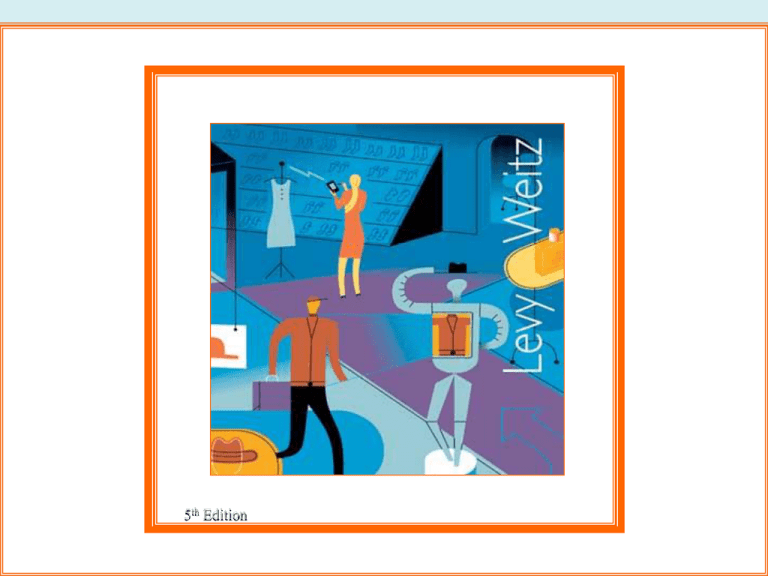
5th Edition
PPT 16-1
Chapter 16
Retail
Communication Mix
McGraw-Hill/Irwin
PPT
16-2 Retailing Management, 5/e
Levy/Weitz:
Copyright © 2004 by The McGraw-Hill Companies, Inc. All rights reserved.
Merchandise Management
Planning
Merchandise
Assortments
Buying
Systems
Retail
Communication
Mix
Buying
Merchandise
PPT 16-3
Pricing
Objectives of Communication Program
Long-Term
PPT 16-4
Short-Term
-Build Brand Image
-Increase Traffic
-Create Loyalty
-Increase Sales
Brands
Distinguishing name or
symbol, such as a logo, that
identifies the products or
services offered by a seller
and differentiates those
products and services from
those offered by competitors
PPT 16-5
Strong Brands Provide Value to
Retailers and Their Customers
Value to Retailers
• Attract Customers
• Build Loyalty
• Higher Prices Leading to
Higher Gross Margin
• Reduced Promotional Expenses
• Facilitates Entry into New Markets
Gap GapKids
PPT 16-6
Value to Customers
• Promises Consistent Quality
• Simplifies Buying Process
• Reduces Time and Effort
Searching for Information
About Merchandise/Retailer
Building a Valuable Brand
Heighten
Brand
Awareness
Develop
Favorable
Associations
Brand
Equity
Consistent
Reinforcement
PPT 16-7
Create Emotional
Connections
Tar-Zhay
PPT 16-8
Benefits of High Brand Awareness
Aided Recall
Top Mind Awareness
PPT 16-9
Stimulates
Visits to
Retailer
Creating Brand Awareness
Memorable
Name
Repeated
Exposure
Brand
Awareness
Symbols
PPT 16-10
Event
Sponsorship
McDonald’s Brand Associations
Fast
Food
Golden
Arches
Big Mac
McDonald’s
French
Fries
Ronald
McDonald
Clean
PPT 16-11
L.L. Bean’s Brand Associations
New
England
Practical
Friendly
L.L. Bean
Expertise
Honest
Outdoors
PPT 16-12
Types of Brand Association
• Merchandise Category – Office Depot
• Price/Quality – Target, Wal-Mart
• Specific Benefit – 7-Eleven Convenience
• Lifestyle – The Nature Company
PPT 16-13
Integrated Marketing Communications
Present a Consistent Brand Image through All
Communications with Customers
•Store Design
•Advertising
•Web Site
•Magalog
PPT 16-14
Brand Extensions
• Gap GapKids and Old Navy
• Sears Sears Auto Centers and
the Great Indoors
PPT 16-15
Using Brand Name on New Concept
Pluses
Minuses
• Develop Awareness and
Image Quickly
• Associations Might Not
Be Compatible with
Extension
• Less Costs Needed to
Promote Extension
PPT 16-16
Retail Communication Mix
PPT 16-17
Communication Methods
PPT 16-18
Types of Sales Promotions
Special sales
Merchandise demonstrations
Premiums
Coupons
Games, sweepstakes, and
contests
PPT 16-19
Comparison of
Communication Methods
PPT 16-20
Steps in Developing a
Retail Communication Program
PPT 16-21
Retail Communications
Program Objectives
Long-term
• Store, Private Label, Brand Building
Short-term
• Immediate Sales
Communication Objectives
• Affecting Specific Stages in Customer’s
Decision Making Process
PPT 16-22
Communication Objectives & Stages in
the Consumers Decision-Making Process
PPT 16-23
Retail and Vendor
Communication Programs
Vendor
Retailer
• Long-term objectives
• Short-term objectives
• Product focused
• Category focused
• National
• Local
• Specific product
• Assortment of
merchandise
PPT 16-24
Methods for Setting Communication Budget
• Marginal analysis
Advertising
Sales
• Objective and task
• Rules of thumb
- Affordable
- Percent of sales
- Competitive parity
PPT 16-25
Sales
Advertising
Marginal Analysis for Setting
Communication Budget
PPT 16-26
Illustration of Objective and Task
Method for Setting a Communication Budget
PPT 16-27
Financial Implications of
Increasing the Communication Budget
PPT 16-28
Illustrations of Communication Programs
• Advertising Program for a
Specialty Home Furnishing
Retailer
• Supermarket Chain Evaluating
a Vendor Promotion
• Planning a Direct
Marketing Program
PPT 16-29
Communication Objectives Furniture Store
Communication
Question
Objective
Awareness
What stores sell Oriental furniture?
Knowledge
Which stores would you rate outstanding
on the following characteristics?
Attitude
On your next shopping trip for Oriental
furniture, which store would you visit first?
Visit
Which of the following stores have you
been to?
PPT 16-30
Evaluation of Program
Before
12 Mon
46%
52%
Awareness
(% of mentioning store)
38%
Knowledge
(% outstanding rating)
9
17
24
13
15
19
8
15
19
Attitude
(% first choice)
Visit
(% of visited store)
PPT 16-31
6 Mon
Considerations in
Evaluating a Vendor Promotion
• Realized margin from the promotion
• Cost of the additional inventory
• Potential increase in sales from the
promoted merchandise
• Potential loss from switching
• Additional sales from more customer visits
PPT 16-32
CRM Campaign Management System
PPT 16-33
Financial Analysis of Easter Promotion
PPT 16-34
Implementing Retail Advertising Programs
• Developing the
Message
• Selecting the Media
• Determining Ad
Frequency and Timing
PPT 16-35
Sources of Assistance in
Developing Ad Campaigns
• Vendors – Co-Op Programs
• Agencies
• Media Companies
PPT 16-36
Suggestions for Developing
Print Ads
• Dominant headline
• Dominant element
• Simple layout
• Specific, complete presentation
• Distinct visuals
• Name and address of store
PPT 16-37
Types of Advertising Media
Newspapers
Direct mail
Magazines
Outdoor
Radio
Shopping guide
TV
Yellow pages
PPT 16-38
Media Capabilities
PPT 16-39
Communication Objectives
and Effectiveness of Media
PPT 16-40
U.S. Expenditures on Advertising
Television
Newspaper
Direct Mail
Radio
Yellow Pages
Magazine
Outdoor
Internet
Misc
PPT 16-41
48 Billion
44
40
14
12
10
2
2 => $30B in 5 yrs
28 Total $200 Billion
Internet Advertising Applications
• Retailers in General
– Create Awareness
– Convey Information
– Brand Building -- Build Store Loyalty
• Multi-Channel Retailers
– Build Web site Traffic
PPT 16-42
Internet -- Advertising Medium
TV, Radio
Internet
Involvement
Push, passive
Pull, active
Reach
Broad
Narrow
Targeting
Limited
Extensive
Information Delivery
Limited
Extensive
Information Richness
Mm, audio
Multi-Media
Measurability
Modest
High
Cost
$12/8 per mm
$20 mm (banner)
Application
Brand Image
Awareness
Product Evaluation
Brand Loyalty
PPT 16-43
Types of Internet Advertising
• Banners - >50% of Expenditures
• Rich Media
• Microsites
• Sponsorships -Embedded in Site Content
• Email
PPT 16-44
Problems with
Measuring Effectiveness
• Comparison with Other Media for the
– Reach
• Counting Unique Visitors
• Use of Cookies
– Frequency
• Caching
• Prevent Cache
– Impact
– GRPs - Reach x Frequency
• Comparison of Internet Advertising Sites
PPT 16-45
Internet Ad Measurement Models
• Consumer Centric
– Panels -- Nielsen TV
– Advantages -- Representative, Relate usage to
Viewer Characteristics, Comparison Across Sites
– Disadvantage - Small Numbers-Unreliable,
Ignores Business Usage
• Site-Centric
– Accurate Measures of Hits, Visits, Downloads, etc
– Problems in Measures, Can’t Relate to Viewer
Characteristics
PPT 16-46
Measuring Effectiveness
Internet Marketer Perspective
• Generating Traffic
– Hits - File Requested - Multiple Files Per Page
• Times Banner Served
– Page Views - Varies with Length of Page
– Visitors
– Unique Visitors
– Click Throughs
– Pages Downloaded
– Length of Stay
PPT 16-47
Generating Traffic for Site
• Domain Name/Brand
• Search Directories and Engines
– Registration, Top Listing
• External Links - Partnerships
• Publicity
• Paid Advertising
– Internet
– Other Media
PPT 16-48
Monitoring Effectiveness of
Traffic Building Approaches
• Monitor Sources of Visits
• Link Behaviors to Sources
–
–
–
–
–
PPT 16-49
Registration
Time on Site
Pages Downloaded
Purchases
Amount Purchased


